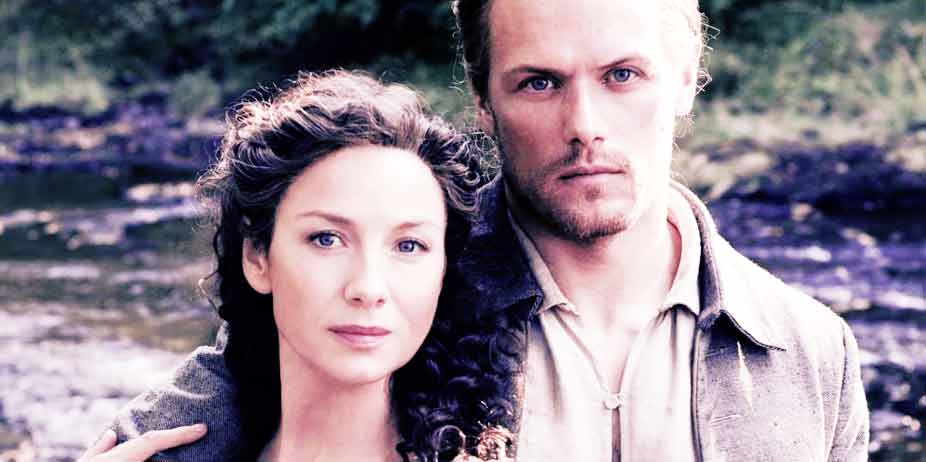
Outlander, Season Two (2016)
After a hair-raising first season, Outlander departs from the Scottish highlands for the French court at the height of its power. The season opens with Claire (Caitriona Balfe) returning to the modern era... muddy, shell-shocked, and missing Jamie. Her husband, Frank (Tobias Menzies), rushes to her side -- and she spins him an incredible story about falling back through time. He doesn't believe it. She's been missing several months... and is carrying another man's child...
Flashing back, Claire and Jamie (Sam Heughan) seek refuge in France. Out of a desire to change history and avert slaughter, they appeal to Bonnie Prince Charles to stem the Jacobite rebellion. He is dead set on reclaiming Scotland and defeating English forces. Jamie tries to befriend him, in an attempt to steer him in better directions. Meanwhile, Claire's assessment that a local ship carries the pox gets its contents quarantined and burned... making an enemy of the ship's owner in the process. Her life is in danger. The child she carries grows heavy in her womb. And then she meets charming little Mary, an innocent girl whom history informs her winds up married to the evil Black Jack Randall. Claire must be careful. She can tamper with history in some ways, in an attempt to save the people she cares about; but one mistake will mean her husband never exists.
Time travel is a difficult concept to work with, and few series do it well. Outlander has a sense of historical accuracy throughout that distracts from the confusing scientific explanations. (If Frank never exists, Claire never went to Scotland and fell back in time, thus she was never in the past to tamper with it... is just one question that goes unaddressed.) Where the previous season was more about romance, this one focuses on forces outside Jamie and Claire's marriage: political shenanigans, court rivalries, the threat of witchcraft accusations, and the politics involved in the uprising. For me, it was sometimes entertaining and sometimes dull as a result. I especially disliked the season finale, which almost entirely takes place in the 1960's. Since the series has departed from Claire's point of view before, it seems odd that it didn't this time -- we spend all season building toward resolutions, expecting to see battle, wondering what will become of Randall... and have none of our questions answered. Instead, most of the hour and a half is spent with Claire's moody daughter, trying to work through her emotions about Mom "cheating" on Dad. Yes, it's similar to the book, but it felt ... anti-climactic.
The other issue I want to raise is the show runners justifying some of their salacious choices. Outlander's main problem is that it shows more than it infers, when an inference is sometimes more powerful. One plot point in the book is when Randall rapes a child. It establishes much of the events to follow. In one episode, we see the child in question startled and Randall move toward him. I thought, "Good... it's harrowing, but more shudder-inducing because we can use our imagination." And then in the next episode, we get a full-blown flashback of what happened next. Defenders of such scenes argue that showing rape as awful helps prove how horrific a crime it is; but in our culture repeatedly showing us graphic rape scenes, we gradually become "used" to them and they no longer carry as much emotional impact. When you show everything, there's no room for intellectual exploration. Alfred Hitchcock knew this better than anyone -- inferring something, and leaving the human mind to fill in the gaps, presents a more terrifying prospect than what the eye can see.
Despite using rape continually as a plot devise, Outlander's second season has less problematic elements than the first. But the mindset behind the rape scenes troubles me.
Sexual Content:
Two consensual sex scenes (one with nudity); one clothed sex
scene under duress (payment for a favor); two graphic rape scenes, one involving
sodomizing a child; whores appear topless and/or naked in a brothel. Some sexual
references and innuendo. All sex scenes include movement and sound.
Language:
Occasional f-words. Abuses of Jesus' name. Profanities.
Violence:
Gruesome battle wounds. Men are stabbed, shot, and beheaded.
A man carries a severed head in one hand, to present to a woman. A man beats his
brother's corpse.
Other:
A "witch" murders someone, then uses his bloody to pass
through a stone into the past.
